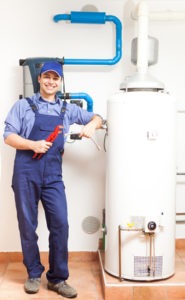Differences Between Tankless Water Heaters And Tank Water Heaters

Tank Water Heaters versus Tankless Water Heaters
A conventional tank water heater tends to be one of those mysterious things that hideaway in an attic, closet or garage and you never think about it until you are out of hot water. These tanks store water at a specified temperature and are released when you turn on the tap, shower or dishwasher. They require annual maintenance which includes flushing the tank to prevent a buildup of deposits which could cause rust.
Tank water heaters can be heated by gas or electricity. Gas water heaters are slightly more expensive than electric tanks because they have to be properly vented to ensure gas does not accumulate indoors. However, over the long term gas tanks cost less to heat because gas is cheaper than electricity. Gas tanks are not affected by power outages because they are not dependent on electricity. Tank sizes vary and can store up to 80 gallons of heated water.
Tankless water heaters do not store water so you don’t have to worry about where it will fit in your home. These are demand-type water heaters and provide hot water on demand. When you need hot water, simply turn your sink or faucet handle to hot. Coldwater is run through the unit where it is heated on demand and arrives at your sink or tub.
Tankless water heaters average from 2-5 gallons of hot water per minute. However, a single tankless heater will not effectively provide hot water to the dishwasher and tub at the same time. A solution to this is to install two tankless water heaters, routing each to an independent water distribution such as the bathroom or dishwasher.
Considering the long-term energy costs and product lifespan is important when deciding on which type of water heater is best for your home. Tankless water heaters tend to be more energy-efficient than tank heaters. They will also achieve higher energy savings which will save on your annual energy costs. These heaters tend to have a life span of 20 years or more while tank heaters last 10-15 years if properly maintained.
If you’re in need of a new water heater for your Birmingham home, then give us a call at 205-631-6445 and let us help you make the right decision for you and your family.
